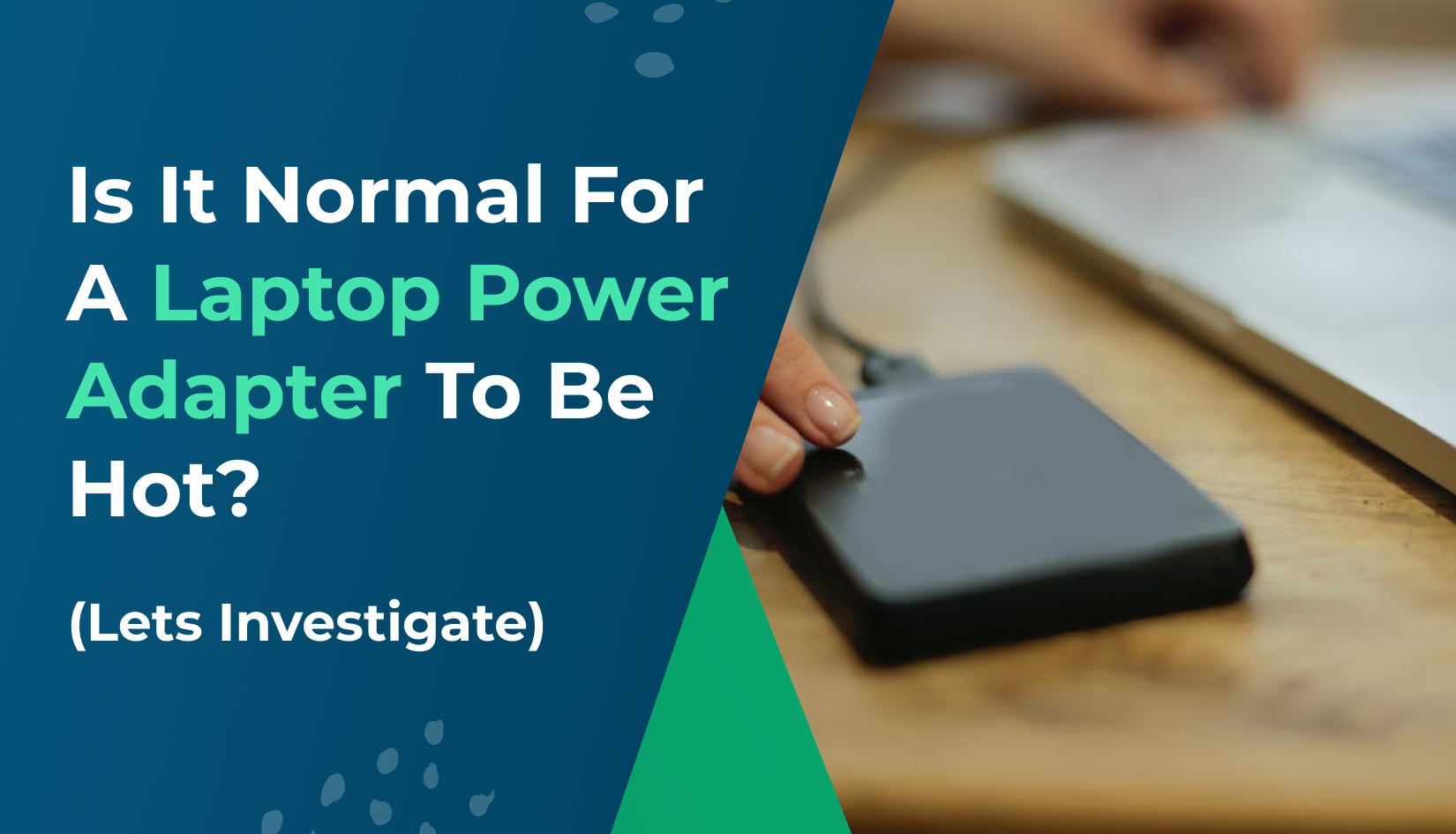One morning, as you reach for your laptop to get some work done, you notice that the power adapter is quite hot to the touch. You wonder to yourself, is this normal? Well, if the adapter is excessively hot, it may be a problem.
Now increased heat not only can reduce battery life but as well as performance. There are a few things you can do to help keep your laptop’s power adapter from getting too hot.
This blog post will closely examine why laptop adapters get hot. We will also take a look at whether is it normal for a laptop adapter to be hot. Stay safe and keep your laptop running well with our tips!
Is It Normal For A Laptop Power Adapter To Be Hot?
Yes, it is perfectly normal for a laptop power adapter to feel warm to the touch. In fact, if your adapter is not generating any heat, that could be a sign that it is not working correctly.
The reason your adapter gets hot is that it is converting AC power into DC power, and this process generates a fair amount of heat.
So, as long as your adapter is not getting too hot to the touch, there is no need to be concerned.
However, if your adapter ever feels hot enough to be uncomfortable or if it begins emitting smoke or sparks, you should unplug it immediately.
These could be signs of a serious malfunction leading to a fire.
4 Causes Of Hot Laptop Power Adapter
Now what can be the possible causes behind a hot laptop power adapter? Let’s take a closer look! Here are the four possible causes behind a hot laptop power adapter.

1- Extended Charger Usage
The most common cause of a hot laptop power adapter is simply extended use. As the adapter is used over time, it will gradually become hot to the touch. This is perfectly normal and is not cause for alarm. However, it may signify a more serious problem if the adapter becomes excessively hot.
Fact:
If you are charger is too old or have broken wires, its good time to get new charger before its too late.
2- Faulty Power Cord
Another possible cause of a hot laptop power adapter is a faulty or damaged AC power cord. If the cord is damaged, it may cause the adapter to overheat. Inspect the cord for any signs of damage, such as frayed wires or a loose connection. If the cord appears damaged, replace it with a new one.
Fact:
Damaged or frayed wires, can lead to short circuit and cause fire too.
3- Placing The Laptop Charger On The Surface Trapping Heat
When you notice that the charger or laptop is placed in any area restricting airflow, it can cause overheating. For example, the sofa, bed, or other surfaces will trap heat while increasing the overall temperature.
Fact:
When you are placing charger in the covered area, you are blocking hot air not to get outside which will increase the temperature of the charger.
4- Problem With The Laptop
A problem with the laptop itself may cause a hot laptop power adapter. If the laptop is overheating, it may also cause the adapter to overheat. Check the laptop for any signs of overheating, such as a hot case or problems with the fan. If the laptop appears to be overheating, try using a different power adapter or contact the manufacturer for assistance.
Fact:
A fault laptop can effect laptop charger, and other attached peripherals.
How To Deal With A Hot (Overheating) Power Adapter?
Laptop power adapters can get hot, mainly if used for extended periods or not properly ventilated. If you are having trouble with your adapter getting too hot, there are a few things that you can do to help mitigate the problem.

1- Keep the Adapter Airy
First and foremost, it is important to ensure that the adapter has good airflow. If it is constantly being covered by a blanket or other piece of clothing, the heat will have nowhere to go and will build up inside the adapter.
Additionally, if you use the adapter on a soft surface like a bed or couch, the heat will have a harder time dissipating and will again build up inside the adapter. Try to use the adapter on a hard, flat surface whenever possible to give it the best chance to stay cool.
Fact:
Always use laptop and its charger in a open area instead of covering.
2- Unplug When Not in Use
Another easy way to help keep your adapter from getting too hot is to unplug it when you are not using it. Even if your laptop is turned off, the adapter will still generate heat as it is constantly powered. Unplugging the adapter when you are not using your laptop can help ensure it stays cool.
3- Use A Power Strip
If your adapter is still getting too hot, even when taking the above precautions, you may want to use a power strip. Power strips often have built-in features that help to regulate the flow of electricity and prevent overheating. This can help to keep your adapter from getting too hot, even if you are using it for extended periods.
4- Check the Laptop’s Battery
It is also important to ensure that your laptop battery is in good condition. A damaged or degraded battery can cause the adapter to work harder and generate more heat. If your laptop’s battery is not in good condition, it is best to replace it to help keep your adapter from getting too hot.
Fact:
With the age of batteries, the cells in it get weak as well. So it cannot pass full current to the laptop which can damage your laptop.
5- Switch the Adapter to Power Saving Mode
If your laptop has a power-saving mode, you may consider using it. Power saving mode can help to reduce the amount of power your adapter uses, which can, in turn, help to keep it from getting too hot. Consult your laptop’s manual to see if it has a power-saving mode and how to enable it.
6- Keep the device off charge for a short period.
If you are not using your laptop but plugged in and charging, the adapter will still generate heat. To help keep your adapter from getting too hot, it is best to unplug it when you are not using your laptop.
7- Replace the Adapter If It’s get Damaged
If you notice that your power adapter is damaged, frayed, or otherwise not in good condition, its time to replace it. A damaged power adapter can cause your laptop to overheat, leading to many problems.
Troubleshooting of a hot laptop power adapter:
If your laptop power adapter is running hot, there are a few things you can do to troubleshoot the issue.
- First, check to ensure the adapter is properly plugged into the laptop and a power outlet. If the adapter is not plugged in correctly, it will not work properly and can overheat.
- Next, check the power cord for any damage. If the cord is frayed or damaged, it must be replaced.
- If the adapter and cord are both in good condition, the issue may be with the laptop itself. Ensure the power settings are set to run the laptop at full power.
- If the laptop runs on battery power, it may be using more power than the adapter can provide, causing it to overheat.
If you still have trouble with a hot laptop power adapter, contact the manufacturer for further assistance.
Frequently Asked Questions
1- Should you be worried if the laptop charger is hot?
As a general rule, it is not advisable to use a laptop charger that is hot to the touch. However, there are a few exceptions to this rule. If the charger is hot but not excessively so, and the laptop is functioning correctly, there is likely no cause for concern. If the charger is very hot or the laptop is not working properly, it is advisable to seek professional help. Additionally, it is always important to read the manufacturer’s instructions carefully to ensure that you use the charger correctly.
2- Can a hot Laptop charger catch fire?
A laptop charger can overheat and catch fire if it is not used properly.
Always make sure to follow the manufacturer’s instructions when using a laptop charger. Never leave a laptop charger plugged in when not in use, and never cover it with anything that could impede airflow. If you notice the laptop charger is getting hot, unplug it immediately and let it cool down before using it again.
3- Do all the laptops use the same charger?
No, all laptops do not use the same charger. In fact, there are several different types of laptop chargers on the market, each of which is designed for a specific make and model of laptop. The most common type of charger is the AC adapter, which plugs into a wall outlet and delivers power to the laptop battery.
However, there are also charging docks and cradles that can be used to charge laptops, as well as USB chargers that can be plugged into a computer or other USB-enabled device. Ultimately, the best way to determine which type of charger is needed for a particular laptop is to consult the owner’s manual or the manufacturer’s website.
4- How to identify my laptop charger?
If you’ve ever misplaced your laptop charger, you know how frustrating it can be to try and find a replacement. Fortunately, there are a few easy ways to identify your charger so that you can buy the correct one.
1- First, check the connector type. Your charger will have either a barrel connector or a rectangular connecter.
2- Second, look at the voltage. This will be listed as either 19V or 20V.
3- Finally, check the amperage. This will be listed as 3.42A or 4.74A.
4- Once you’ve gather this information, you can easily purchase the correct charger for your laptop. And if you ever find yourself in need of a replacement, you’ll be able to quickly and easily identify the right one.
Conclusion
Overall, if your charger is hot to the touch, that isn’t necessarily cause for alarm—but you should take some preventative measures to ensure that it doesn’t overheat and become a fire hazard.
However, if the charger is excessively hot, then it could be alarming. Follow this detailed guide to solve the issue. It will also help you avoid any potential disasters.


Write a Reply or Comment